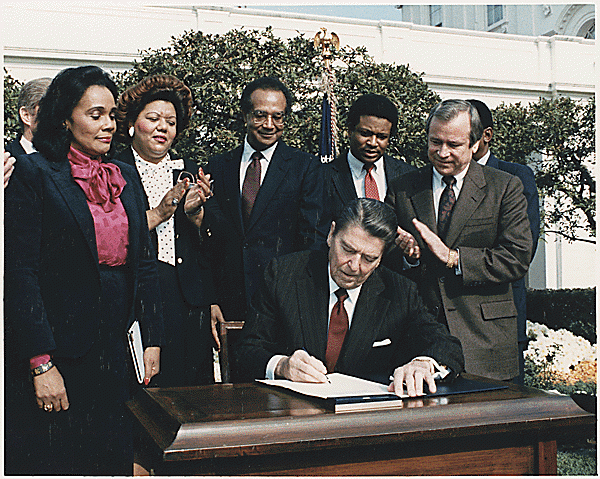6 surprising facts about the King Holiday

President Reagan grudgingly signed the King holiday into law in 1983. There was then an effort to de-fund it that was led by U.S. Sen. Jesse Helms of North Carolina and supported by current Senate Majority Leader Mitch McConnell of Kentucky. (White House photo via Wikipedia.)
Today, as we celebrate the life of a great man who has become a symbol for millions world-wide in the struggle for justice, freedom and peace, it seems everyone likes Dr. Martin Luther King, Jr. It's the rare crackpot -- like blogger Ben Domenech, who the Washington Post tried to hire until he had difficulty explaining why he dismissed Martin and wife Coretta as "communists" -- that openly criticizes King. Those who don't support King's vision of a world without "poverty, racism and war" prefer to sanitize and co-opt King's message, not directly attack it.
It wasn't always this way. The struggle to have a King Holiday was a 15-year, protracted battle, and political leaders who now trip over each other to shake hands at King Day events were slow to embrace this day of remembrance.
The University of Texas at Austin has a wonderful website documenting the struggles and detours that led to the King Holiday being grudgingly signed into law by President Reagan in 1983 (there's also a chronology at the King Center). Following are a few interesting factoids from this story:
(1) The King Holiday first came up for a vote in the U.S. House in 1979, where it lost by 5 votes
(2) Some notable politicians who voted against the King Holiday when it came up again:
Sen. John McCain (R-AZ, then a House member. Salon reports McCain "later offered a mea culpa, did a 180-degree turn on the issue and lobbied Arizona legislators to pass the holiday" when it came up for a state vote. McCain wasn't completely reformed: in 2000, his South Carolina strategist was Richard Quinn, editor of the racist Southern Partisan magazine, who one said that King's "role in history was to lead his people into a perpetual dependence on the welfare state, a terrible bondage of body and soul.").
Sen. George "Macaca" Allen (R-VA, then a VA state delegate)
Sen. Trent Lott (R-MS, also as a House member; he also voted to de-fund the holiday in 1994)
Sen. Frank Murkowski (R-AL, who left office in 2002)
Sen. John Tower (R-TX, who led the 1987 "Tower Commission" and who Bush I appointed Secretary of Defense in in 1989, but wasn't confirmed)
Many others voted with the majority to oppose a King Holiday in 1979, including Dick Cheney, who later switched their votes in 1983.
(3) Some notables who supported the King Holiday in 1983:
Sen. Strom Thurmond (R-SC, a former staunch segregationist)
Sen. Robert Byrd (D-WV, a former Klan member)
Rep. John Kemp (R-NY, who co-sponsored the bill)
(4) Several Senators supported a bid by Sen. Jesse Helms (R-NC) to de-fund the King Holiday, including Mitch McConnell (R-KY, still in office), Don Nickles (R-OK, voted out), and Trent Lott.
(5) The King Holiday wouldn't have happened without a massive national campaign, including millions of petition signatures and the open advocacy of the Congressional Black Caucus. Rep. John Conyers (D-MI) introduced a bill for a holiday every year from 1968 to 1983. In the end, it was a bill introduced by first-year Rep. Katie Hall (D-IN) in 1983 that passed.
(6) Lore has it that it only cleared once a compromise changed the holiday date to accommodate the Super Bowl.
Tags
Chris Kromm
Chris Kromm is executive director of the Institute for Southern Studies and publisher of the Institute's online magazine, Facing South.
